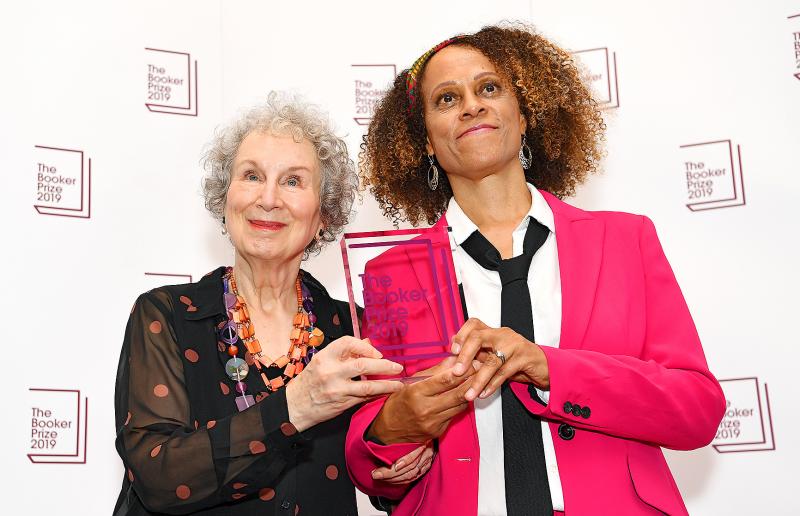Eight debut novelists came up against veterans Hilary Mantel and Tsitsi Dangarembga when Britain unveiled a US-dominated longlist of finalists Tuesday for its revered Booker Prize.
One of the world’s most celebrated literary competitions tore up the rule book last year by splitting the fiction award between Canada’s Margaret Atwood and Anglo-Nigerian author Bernardine Evaristo.
It courted controversy on this occasion by pitting nine Americans or dual-US citizens against just three Britons and Zimbabwe’s Dangarembga.

Photo: EPA-EFE
“There are voices from minorities often unheard, stories that are fresh, bold and absorbing,” judges’ panel chair Margaret Busby said.
“Unplanned, our final selection encompasses both seasoned favorites and debut talents — a truly satisfying outcome.”
‘YEAR OF SEISMIC CHANGE’
The title of best work of English-language fiction published in the UK and Ireland has launched careers and caused countless arguments since its creation in 1969.
Past laureates have ranged from contemporary giants such as Ian McEwan and Julian Barnes to Kazuo Ishiguro and Roddy Doyle.
This year’s 13-title longlist — to be whittled down to a shortlist of six on Sept. 15 before the winner is unveiled in November — features nine female authors.
“In this year of seismic change, visibility for new books published in the UK has been drastically low,” the Booker Prize Foundation’s literary director Gaby Wood said.
“So, however unintended the ratio, it’s especially heartening to know that some authors who have launched their careers in the midst of COVID-19 may now have a chance to reach the readers they deserve.”
The five-judge panel picked through 162 novels either published or scheduled for release in the 12 months ending on Sept. 30.
Britain was represented by Mantel — nominated for The Mirror & The Light — and debutants Sophie Ward and Gabriel Krauze.
Mantel won the Booker in 2009 for Wolf Hall and in 2012 for Bring Up the Bodies.
The panel said her latest entry “completes a tragic arc in which Thomas Cromwell is finally brought down by the police state he designed.”
Mantel’s “masterful exhibition of sly dialogue and exquisite description brings the Tudor world alive,” the panel of judges said.
‘SWEEP OF HISTORY’
Irish-American US National Book Award winner Colum McCann was nominated for Apeirogon about two Israeli and Palestinian fathers coming together over shared grief at losing their sons. He was longlisted for TransAtlantic in 2013.
The panel called Apeirogon “a moving reflection on what it might mean to make peace between two warring sides.”
Dangarembga’s nomination for This Mournable Body is her first in a distinguished career that has spanned four decades and featured plays and films.
Her new book “drew an immediate reaction like a sharp intake of breath from all of us on the panel,” the judges said.
“The breakdown of the protagonist and the breakdown of a country are inextricably linked in this arresting novel from a mercurial writer.”
Panel chair Busby said the longlist features “novels carried by the sweep of history.”
The works “represent a moment of cultural change, or the pressures an individual faces in pre- and post-dystopian society,” she said.
Organizers said the 2020 winner will receive ?0,000 (US$64,000) “and can expect international recognition.”

This month the government ordered a one-year block of Xiaohongshu (小紅書) or Rednote, a Chinese social media platform with more than 3 million users in Taiwan. The government pointed to widespread fraud activity on the platform, along with cybersecurity failures. Officials said that they had reached out to the company and asked it to change. However, they received no response. The pro-China parties, the Chinese Nationalist Party (KMT) and Taiwan People’s Party (TPP), immediately swung into action, denouncing the ban as an attack on free speech. This “free speech” claim was then echoed by the People’s Republic of China (PRC),

Exceptions to the rule are sometimes revealing. For a brief few years, there was an emerging ideological split between the Democratic Progressive Party (DPP) and Chinese Nationalist Party (KMT) that appeared to be pushing the DPP in a direction that would be considered more liberal, and the KMT more conservative. In the previous column, “The KMT-DPP’s bureaucrat-led developmental state” (Dec. 11, page 12), we examined how Taiwan’s democratic system developed, and how both the two main parties largely accepted a similar consensus on how Taiwan should be run domestically and did not split along the left-right lines more familiar in

Many people in Taiwan first learned about universal basic income (UBI) — the idea that the government should provide regular, no-strings-attached payments to each citizen — in 2019. While seeking the Democratic nomination for the 2020 US presidential election, Andrew Yang, a politician of Taiwanese descent, said that, if elected, he’d institute a UBI of US$1,000 per month to “get the economic boot off of people’s throats, allowing them to lift their heads up, breathe, and get excited for the future.” His campaign petered out, but the concept of UBI hasn’t gone away. Throughout the industrialized world, there are fears that

Most heroes are remembered for the battles they fought. Taiwan’s Black Bat Squadron is remembered for flying into Chinese airspace 838 times between 1953 and 1967, and for the 148 men whose sacrifice bought the intelligence that kept Taiwan secure. Two-thirds of the squadron died carrying out missions most people wouldn’t learn about for another 40 years. The squadron lost 15 aircraft and 148 crew members over those 14 years, making it the deadliest unit in Taiwan’s military history by casualty rate. They flew at night, often at low altitudes, straight into some of the most heavily defended airspace in Asia.